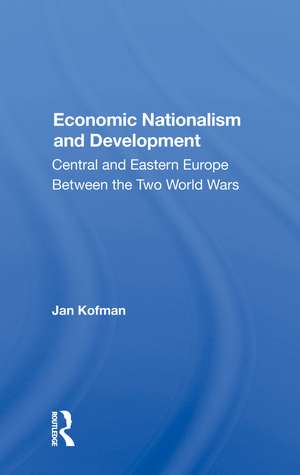Economic Nationalism And Development: Central And Eastern Europe Between The Two World Wars
Autor Jan Kofmanen Limba Engleză Hardback – 18 apr 2019
Preț: 764.20 lei
Preț vechi: 1027.43 lei
-26% Nou
Puncte Express: 1146
Preț estimativ în valută:
146.23€ • 159.34$ • 123.22£
146.23€ • 159.34$ • 123.22£
Carte tipărită la comandă
Livrare economică 23 aprilie-07 mai
Preluare comenzi: 021 569.72.76
Specificații
ISBN-13: 9780367011956
ISBN-10: 0367011956
Pagini: 258
Dimensiuni: 145 x 229 mm
Greutate: 0.45 kg
Ediția:1
Editura: Taylor & Francis
Colecția Routledge
Locul publicării:Oxford, United Kingdom
ISBN-10: 0367011956
Pagini: 258
Dimensiuni: 145 x 229 mm
Greutate: 0.45 kg
Ediția:1
Editura: Taylor & Francis
Colecția Routledge
Locul publicării:Oxford, United Kingdom
Cuprins
Introduction -- Economic Nationalism: Description -- Theoretical and Research Approaches -- Economic Nationalism: Overview, Sources, and Causes -- Directions and Instruments of Economic Nationalism -- Tentative Conclusions -- Protectionism as a Response to Underdevelopment -- On Protectionism's Theory and Practice -- Policy of Protectionism in East and Central Europe: Overview -- Protectionism in the Region: The Experience of Poland, Czechoslovakia, and Bulgaria -- Recapitulation and Conclusions -- Epilogue: Questions for Discussion, Hypotheses, and Summary
Notă biografică
Jan Kofman is professor of history and political science at the University of Warsaw (the Bialystok Branch) and at the Institute of Political Studies of the Polish Academy of Sciences. He is also editor in chief and deputy director of Polish Scientific Publishers PWN, the largest academic publishing house in Poland. He was editor in chief of KRYTYKA (1982-1995), an underground turned official political quarterly established in 1978.
Descriere
Drawing on archival sources as well as published materials in eight languages, Jan Kofman analyzes both the intent and the efficacy of nationalist policies and economic protectionism in Europe's central and eastern regions—traditionally, its weaker and less industrialized states.
